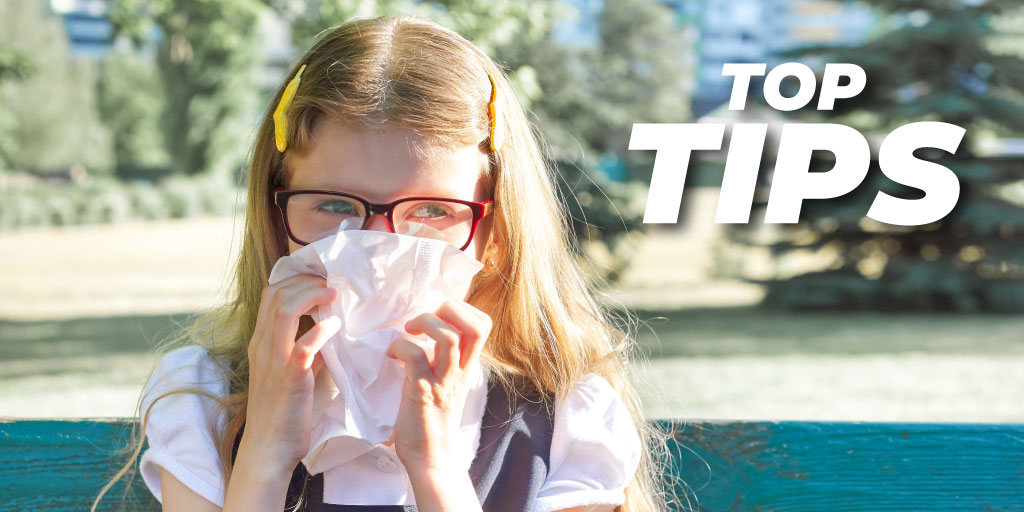Did you know that up to 30% of British children suffer from hay fever, according to research by the NHS? Getting kids involved in outdoor activities is a great way to take advantage of good weather. But with good weather comes seasonal hay fever!
Here are our top tips for parents on how to manage hay fever season.
Checking for symptoms – who’s on runny nose patrol?
A runny nose, itchy eyes, and non-stop sneezing – are symptoms of hay fever that are hard to ignore. However, it’s best to get a firm diagnosis from a doctor to make sure it isn’t an allergy. Allergies to dust mites and pet fur can become more apparent at certain times of the year so it’s best to run it by your local GP.
Usually, hay fever will appear around the same time each year. Some children are affected in the summer and the spring, with changes in the weather being the best indicators. The most common symptoms can be treated with over-the-counter antihistamines in either liquid or tablet form. Don’t leave it to just medication though, a healthy diet including Vitamin C can help them recover in half the time!
Sports days/days outdoors are coming up – how do I prepare?
Don’t forget the Kleenex!
If they’re packing a lunch and a bag, don’t forget a pack of tissues in with their kit. Having to dig through piles of stuff for adults and children can make a small problem, worse! Look for a side pocket on a bag, in or out, to keep tissues close.
Nix the handkerchiefs. They aren’t hygienic at all and will make hay fever much worse!
Protect their peepers
Protecting their eyes is key to reducing them from scratchy-feeling eyes! Make sure they keep their hands away from their faces as much as possible and invest in a pair of sunnies!
Not as a fashion accessory but a pair of wraparound glasses can protect their eyes from irritation. Running and jumping on grass is likely to raise pollen levels, so protect their eyes and ensure a fun-filled day with a pair that won’t fall off in the midst of the crazy goal-scoring celebrations!
Guard their noses
Outside of the eyes, noses are a prime place for pollen irritations! Keeping the nostrils clear can prevent those stuffy noses you find with hay fever. For children, take a clean cotton bud with a light amount of Vaseline or petroleum jelly and wipe it around the nostril. Beware of the squirming on this one!
Very similar to a COVID-19 test, but be sure not to linger. A quick wipe around before a visit to the park or before they set off for camp can prevent dander and pollen from going up their nose. The jelly creates a sticky surface that can be easily wiped clean at the end of the day.
Close the windows at night
Yes, we know! This is the weather when you want to throw the doors and windows open and let in the sunshine. But when children are young, one bout of hay fever can be uncomfortable and take them off the field.
Closing windows at night especially is great for when pollen begins to rest on surfaces. Usually, during the day, pollen counts are high but at night, that’s when they float down on surfaces. You’ll stop pollen from finding its way in and effectively reduced strong bouts of the seasonal infection.
Wash their faces regularly
This is your best bet when it comes to reducing those pesky irritations. Hay fever might not affect them when they’re playing but can really dial up the pressure when they’re at rest. So after they come in and throw their bags down, it’s time to get them in the tub! Washing their face, hands and hair can help get rid of any lingering dander, plus a change of clothes can reduce the effect of pollen while resting.
If they’re already tackling hay fever, washing their face regularly can also help to clear out their sinuses. On hot days, a splash of cold water couldn’t be more refreshing!
and Exercise!
Did you know that exercise can actually relieve some of the symptoms of hay fever? Get them outside (or inside) moving about as much as possible. Once they are on the move, their bodies will often reduce mucus production and clear airways to give them space to breathe. The more they move, the less bunged up they’ll feel!
Stay active and stay safe with First Step Sports Group!



